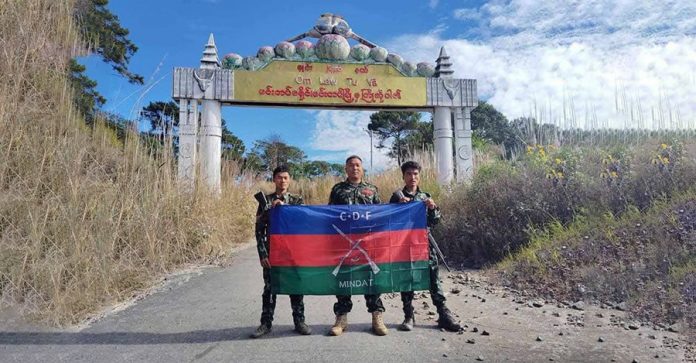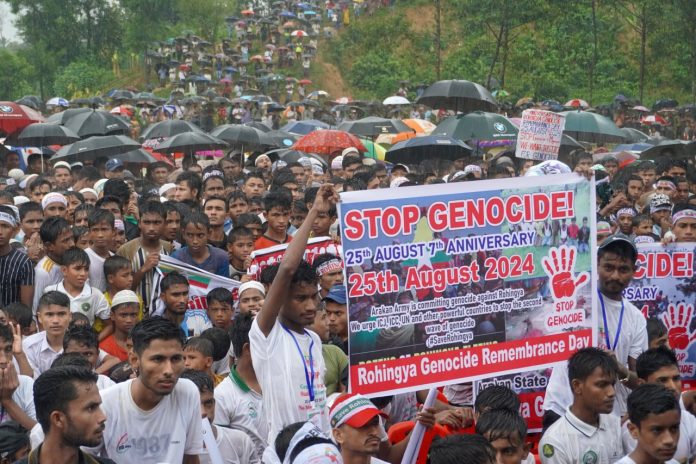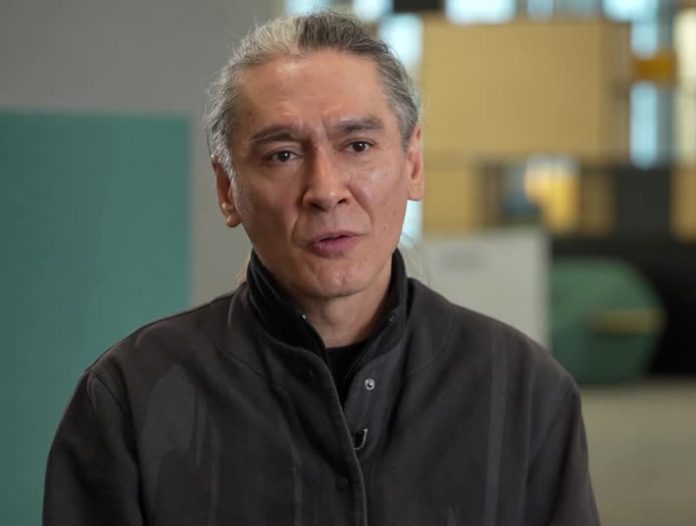Guest contributor
Shafiur Rahman
Foreign Affairs Adviser Md. Touhid Hossain’s recent remarks on the Rohingya crisis, delivered at a dialogue titled Bangladesh’s Interests and Security in Geopolitical Reality, reveal a troubling continuity in Bangladesh’s approach to one of the most pressing humanitarian crises in the region.
On Dec. 19, Hossain attended an emergency meeting in Bangkok with regional counterparts to review the current situation in Myanmar. Organized by the Thai government, the meeting included foreign ministers and senior officials from Bangladesh, Myanmar, India, China, Laos, and Cambodia.
While Hossain’s comments superficially emphasise peace and stability, they perpetuate a problematic narrative that has long underpinned the state’s policies towards the Rohingya—a narrative that not only absolves Bangladesh of responsibility but also entrenches its role in the marginalisation of the Rohingya people.
The “ticking time bomb” mantra
In his speech, Hossain reiterated the familiar trope of the Rohingya as a demographic “ticking time bomb,” warning his counterparts in Bangkok about the potential radicalisation of young Rohingya men.
“If you don’t resolve the Rohingya and given their demographic patterns,” he cautioned, “if you have 200,000 young boys who do not see light at the end of the tunnel, they will become desperate, and desperate people do desperate things.”
This rhetoric, a staple of Bangladesh’s diplomatic messaging, seeks to externalise the crisis while simultaneously justifying policies that exacerbate the very desperation it laments.
Yet, even as Hossain raised the spectre of regional instability, he revealed the government’s intent to press for repatriation within an implausible two to six-month timeframe.
He claims that he told his counterparts: “I was hoping that in the next two to six months, I would be able to send some [Rohingya] back, and if peace is established, they have to be sent back; otherwise, you won’t have peace either.”
Given the tumultuous state of Arakan (Rakhine State) in 2024, this timeline is not only unrealistic but irresponsible, serving more as a tool for domestic posturing than a serious policy objective.
A self-fulfilling prophecy
Bangladesh’s actions towards the Rohingya population have consistently undermined the peace and stability it claims to champion.
Hemming hundreds of thousands of people inside barbed-wire camps, restricting their movement, and denying them access to education and employment opportunities create conditions of abject despair.
Such policies not only criminalize an already vulnerable population but also fuel the potential for unrest and instability that Hossain warns against.
Recent events illustrate this hypocrisy. The government’s decision to allow armed groups to operate with impunity within the camps, culminating in a massive rally held by these discredited and violent factions in Kutupalong refugee camp on Dec. 25, signals a dangerous abdication of responsibility.
Far from fostering security, these actions destabilize the camps and heighten tensions, further alienating the Rohingya from the broader society.
Complicity in secondary persecution
As Maung Zarni astutely observed: “Buddhist Myanmar misframes Rohingya Muslims as a threat to national security and adopts a policy of genocidal destruction. Muslim Bangladesh misframes the survivors as embryonic jihadis and adopts a policy of secondary persecution, if not outright genocide. Starting with denial of education, legal rights as refugees, and, in short, denial of a future. First, cage them in and ship them out to the prison island while touting the government as ‘compassionate’ and ‘generous.’ This is nothing short of preemptive criminalisation of 400,000 young survivors.”
Hossain’s assertion that repatriation is contingent upon peace in Myanmar conveniently sidesteps Bangladesh’s obligations under international law.
While peace in Myanmar is undoubtedly essential, it cannot serve as a pretext for abandoning the Rohingya to indefinite limbo. Bangladesh remains accountable for hosting refugees, which includes granting access to employment, education, and freedom of movement.
The illusion of repatriation
The demand for the early repatriation of forcibly displaced Rohingyas, while well-intentioned, fails to address the deeper structural and systemic issues that have historically undermined the long-term stability of the region.
Bangladesh has engaged in repatriation efforts for decades, yet these efforts have not resulted in sustainable peace or security, either for the Rohingya population or the region as a whole. Bangladesh’s push for early repatriation under current conditions raises significant questions about its feasibility and legitimacy.
Even as Bangladesh engages with the international community, including preparations for the upcoming U.N.-led conference on the Rohingya crisis tentatively scheduled for this year, its actions at home reveal a stark contradiction.
Khalilur Rahman, the High Representative of the Chief Adviser Mohammed Yunus on the Rohingya crisis, recently met with the President of the U.N. General Assembly to emphasise Bangladesh’s commitment to the conference and its outcomes.
The emphasis on “early repatriation,” reiterated in these discussions, only serves to show Bangladesh’s external posturing. Without putting its own house in order—by improving camp conditions, dismantling armed groups, and granting the Rohingya basic rights—such international overtures risk being seen as performative rather than meaningful steps toward a solution.
The situation in 2024, with the Myanmar military losing control of the state and the Arakan Army (AA) emerging as the de facto authority, fundamentally challenges the premise of any repatriation effort.
The AA, a non-state actor without international recognition or legal standing to enter into binding agreements, cannot guarantee the safety and dignity of returning Rohingyas. The recent violence Rohingya witnessed in Arakan will not inspire their confidence either.
While Bangladesh reportedly maintains informal relations with the AA, such unofficial ties lack the accountability and oversight required for large-scale repatriation. Furthermore, the AA’s ambiguous stance on the Rohingya issue, focused primarily on Rakhine nationalism, does not inspire confidence in their ability—or willingness—to include Rohingyas in their vision for governance.
Northern Arakan remains a fragmented space, with limited governance and significant security concerns. Without a stable administrative framework, any repatriation risks exacerbating insecurity for returnees.
The way forward
If Bangladesh genuinely seeks peace and stability in the region, it must adopt policies that empower rather than oppress the Rohingya. However, each of these steps faces significant hurdles, not least because of Bangladesh’s own policies and the broader geopolitical realities.
- Recognizing the Rohingya as refugees: While granting the Rohingya legal status and associated rights such as education, employment, healthcare, and freedom of movement would dramatically improve their living conditions, Bangladesh has consistently resisted taking this step. Officially labelling them as refugees would require Bangladesh to comply with international legal frameworks, which it has thus far avoided. Moreover, there is domestic utility in maintaining the status quo—caging the Rohingya in camps and framing their plight as a security risk rather than addressing their rights as displaced individuals.
- Dismantling armed groups: The presence of armed groups in the camps has exacerbated insecurity for the Rohingya, yet the government has tolerated their operations, seemingly as a way to maintain control over the camps without direct accountability. These groups have not only destabilised the camps but also served as a tool of foreign policy, with reports indicating that Rohingya fighters have been recruited to serve alongside the Myanmar military. This covert strategy aligns with Bangladesh’s broader goal of externalising the crisis while undermining the legitimacy of the Rohingya’s struggle. Dismantling these factions would require not just political will but also an acknowledgment of the government’s complicity in fostering this environment.
- Engaging the international community: While regional players like China, India, and the Association of Southeast Asian Nations (ASEAN) must be involved in discussions about northern Arakan’s governance dynamics, this is far from a quick fix. These actors’ prioritisation of stability, economic opportunity, and the principle of “non-interference in member states’ internal affairs” often undermines meaningful engagement. Their influence over both the Myanmar military and the AA could theoretically foster dialogue, but their actions to date suggest little interest in championing justice or human rights for the Rohingya. Bangladesh’s reliance on these players to resolve the crisis risks perpetuating the same cycles of displacement and marginalisation.
Hossain’s remarks are emblematic of a broader failure to address the Rohingya crisis with the seriousness and humanity it demands. Bangladesh’s rhetoric and actions are not merely contradictory; they are counterproductive, sowing the seeds of the very instability the state purports to fear. Repatriation efforts, in the absence of fundamental changes in Arakan, are doomed to perpetuate cycles of displacement and insecurity.
It is time for Bangladesh to abandon its self-serving narratives and adopt a genuinely compassionate and rights-based approach to the Rohingya crisis. To repeat, Bangladesh remains accountable for hosting refugees.
It has ongoing obligations towards improving refugee conditions. This includes granting access to employment, education, and movement for the Rohingya. Anything less is not only a moral failure but a recipe for enduring insecurity.
Shafiur Rahman is a journalist and documentary maker. He writes the Rohingya Refugee News newsletter.
DVB publishes a diversity of opinions that does not reflect DVB editorial policy. We’d like to hear what you think about this or any of our stories: [email protected]








